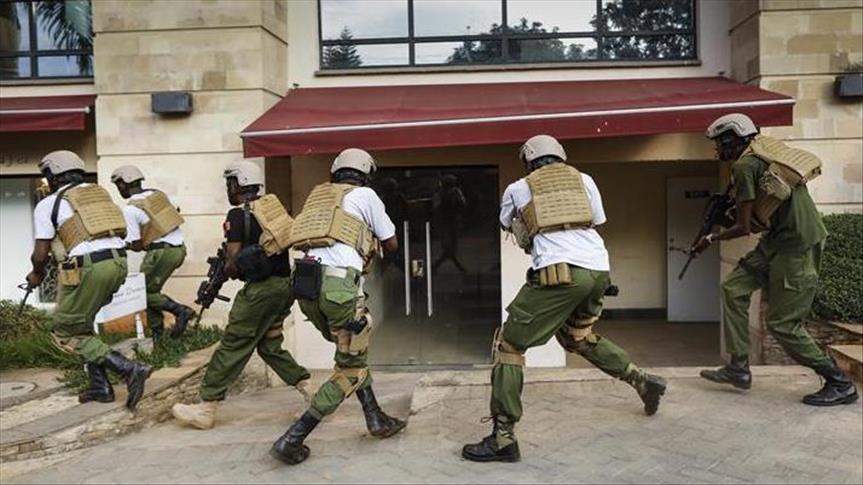
By Hassan Isilow
JOHANNESBURG
Kenya is frequently attacked by al-Shabaab militants because it hosts a number of UN agencies and is a regional economic powerhouse that once attacked draws international media attention, experts have told Anadolu Agency.
“Kenya has many foreign diplomatic missions and is the wealthiest in the region, so an attack creates global attention,” Yusuf Serunkuma, a research fellow at Uganda-based Makerere University, told Anadolu Agency in an interview on Monday.
He said Kenya has many media houses with foreign journalists located in its capital Nairobi, so an attack on the country receives wide media coverage, which al-Shabaab exploits to spread its propaganda.
“Frequent attacks on Kenya also confirm that al-Shabaab still has the capacity to strike beyond its borders in Somalia,” He noted.
The Somali-based al-Qaeda-linked terrorist group has previously stated that it attacks Kenya in retaliation for its contribution to peacekeeping in Somalia.
Kenya initially sent its troops to Somalia in October 2011 after al-Shabaab terrorists reportedly abducted aid workers in the country. But it later decided to contribute troops to the African Union peacekeeping mission in Somalia (AMISOM) to help bring peace to its northern neighbor.
However, since then Kenya has faced a number of attacks, including the 2015 Garissa University assault which killed 148 people.
The infamous Westgate mall attack in the capital Nairobi also claimed several lives in 2013. The terror group has also used grenades to attack small commuter buses in Nairobi.
In 2010, al-Shabaab attacked two venues in the Ugandan capital Kampala killing dozens but has since focused its cross border terror attacks mainly on Kenya.
Serunkuma says the group now portrays to be advancing international jihadist agendas.
Last week, al-Shabaab carried out another deadly raid on a hotel complex in Nairobi, killing 21 people. It said the attack was a retaliation for U.S. President Donald Trump’s decision to recognize Jerusalem as the capital of Israel.
Al-Shabaab has been fighting the UN-backed Somali government for over a decade now with hopes of overthrowing it so as to impose a rigorous version of Islamic law.
In recent years, the African Union peacekeepers and the Somali Army have managed to push the terror outfit from major cities into rural areas.
Al-Shabaab also carries out frequent bomb attacks in Somalia with the worst attack being the October 2017 truck bomb which killed over 500 people in the capital Mogadishu. The group often attacks restaurants and hotels using car bombs.
It uses similar tactics when attacking neighboring Kenya.
Withdraw troops
Other regional experts say the frequent attacks on Kenya are aimed at shaping public opinion in the country so that citizens pressure their government to withdraw troops from Somalia.
Andrews Atta-Asamoah, a security expert on the Horn of Africa, believes that withdrawing Kenyan troops from Somalia will not stop al-Shabaab from continuously attacking its neighbor.
“Kenya is a major tourism destination and an attack on the country affects different nationalities that frequent it and that’s what al-Shabaab wants,” he told Anadolu Agency in an interview from South Africa’s capital Pretoria.
He also believes that high unemployment among Kenyan youths makes them vulnerable to extremist groups.
“The presence of sleeper cells and sympathizers of al-Shabaab among radicalized Kenyans also makes it easier for the group to launch attacks in Kenya,’’ he said.
However, Serunkuma and Atta-Asamoah both dismissed claims that Kenya’s proximity to Somalia could be responsible for the increased attacks, saying other African Union member states that contribute peacekeepers to Somalia are equally close by but are hardly ever attacked.
Porous border
Kenyan national Abu Sakeena told Anadolu Agency he believes Kenya’s porous border with Somalia has enabled al-Shabaab terrorists to easily cross into Kenya and commit atrocities.
“The public is not as vigilant as for example in Rwanda, where the public would report any new face to the authorities,” he said in a text message.
He also claimed that Kenyan security officials often take bribes from undocumented migrants and refugees, making the country vulnerable to attacks.
Other Kenyan nationals whom Anadolu Agency spoke to suggested that Kenya should increase its policing and intelligence gathering.
“Kenyan nationals of Somali origin must not be seen as sympathizers of al-Shabaab but should be seen as citizens and used as partners in the fight against terrorism,” Mombasa resident Mike Omollo told Anadolu Agency via Twitter.
Kenyans of Somali origin have often complained of being harshly treated by security personnel because of their origin yet they are Kenyans, which experts say could instead radicalize them making it difficult to fight terrorism.
The northeastern provinces of Kenya, which border Somalia, are mainly inhabited by people of Somali origin.
Kenyan government spokesmen were not willing to comment on the subject, saying they cannot be drawn into speculation.
*Magdalene Mukami contributed to this story from Nairobi, Kenya
Anadolu Agency website contains only a portion of the news stories offered to subscribers in the AA News Broadcasting System (HAS), and in summarized form. Please contact us for subscription options.








